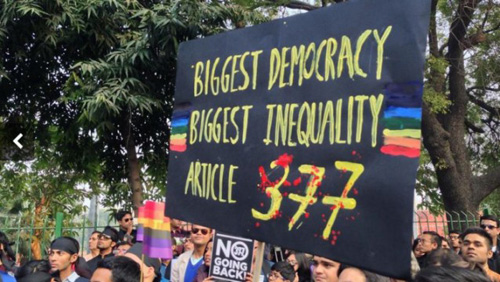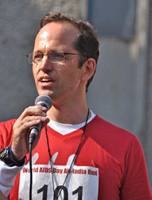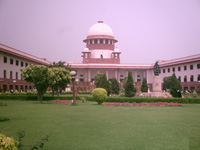Posted by Lucile Scott on February 5, 2014

Indians take to the street to protest the Supreme Court decision recriminalizing homosexuality. (Photo: ThinkProgress)
In 2009, the Delhi High Court overturned Section 377 of the Indian Constitution, a colonial-era law stating that same-sex sexual conduct is an "unnatural offence" punishable by a 10-year jail term. The Delhi decision called the law discriminatory and added that sex between consenting adults should never be a crime. On December 11, the Indian Supreme Court overturned that decision. This recriminalization of homosexuality sparked vocal outrage, not only among an LGBT community asserting that its members couldn’t simply return to the closet after four years, but across the social spectrum—from political leaders to Bollywood stars. All agree that a law violating citizens’ human rights has no place in a modern democracy.
The Indian government had chosen not to appeal the 2009 Delhi High Court decision (the appeal was brought by conservative groups), implicitly supporting that decision, and following the December ruling, the government filed a petition asking the Supreme Court to reconsider its decision. On January 28, the court dismissed the petition, leaving the ruling in place. amfAR talked to James Robertson, executive director of the India HIV/AIDS Alliance, and Javid Syed, program director at American Jewish World Services, about the on-the-ground impact of the startling decree.
 James Robertson, executive director of the India HIV/AIDS Alliance, speaking during World AIDS Day 2012.
James Robertson, executive director of the India HIV/AIDS Alliance, speaking during World AIDS Day 2012. amfAR: What reactions to the decision have you seen in India?
James: First, what happened in 2009 wasn’t really the result of a huge social movement that built up over time, but the effort of a few very smart people who saw an opportunity under the Indian constitution to question this law. That is one reason we’ve slipped back. The gay rights movement didn’t build the necessary political and social support. So that’s what people are talking about now—how to build a coherent and broad-based movement. Legal change is the result of social change, and in the past two months, I have seen the gay rights movement build energy and urgency that we didn’t have before. I think that India will actually gain from this in the longer term.
Javid: The English language media in India has been overwhelmingly against the ruling and positive. Other language media apparently is more of a mixed bag. On the political front, the ruling Congress party came out against the Supreme Court verdict, but the main opposition party, BJP, came out for it, and it is highly unlikely that the Congress government will get enough support amongst the legislature to change this law.
amfAR: Has the recriminalization of homosexuality had an impact on HIV outreach, or do you think it will in the future?
James: We are running the largest MSM and transgender program in India, outside of the government. Nowhere have we seen that just focusing on condoms solves the problem of HIV. Particularly in marginalized groups, the fact that they question their self-worth and social value and face discrimination in their daily lives is hugely important when it comes to HIV risk. So will the recriminalization of homosexuality have an impact on our work? How could it not? We already have reports of HIV outreach workers being harassed by police. I think it may also create problems with outreach materials about anal sex. If you say, ‘Wear a condom when you have sex,’ that’s not incredibly helpful if someone thinks sex just means vaginal intercourse and thinks anal intercourse is something else. We need to be very clear about the risk factors and this law is a consideration in openly discussing that.
 The Indian Supreme Court building. (Photo: Legaleagle86)
The Indian Supreme Court building. (Photo: Legaleagle86)Javid: The government has taken huge strides to overtly support the connection between the human rights of most-at-risk populations and an effective HIV response. It is unlikely that these programs will go away, though the verdict does now put parts of the government response in contradiction with the law.
James: The government isn’t backing away from prevention and that’s good, but not recognizing that the decision will create barriers is naïve. We still have a couple hundred thousand more people we need to bring into our HIV program for GMT, and this could cause many of them not to join. And in India, even if that’s just 10% of the people who might have signed up, that’s a large number. We now have one-sixth of the world’s population living under a backwards 19th century British law. But now we can’t blame the British. Modern India at the highest level made this judicial error and travesty. Many of us know what the right side of history is. India is now not on it.